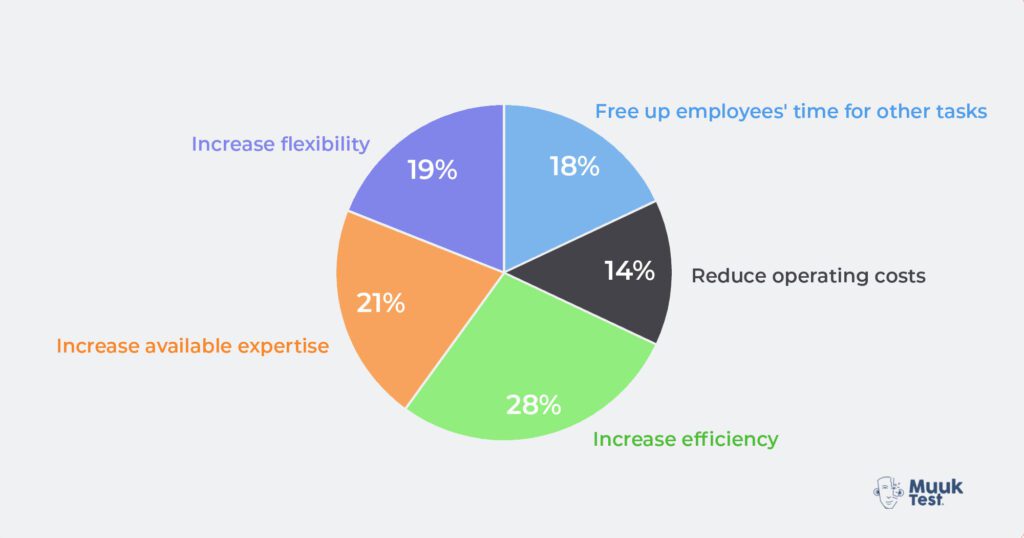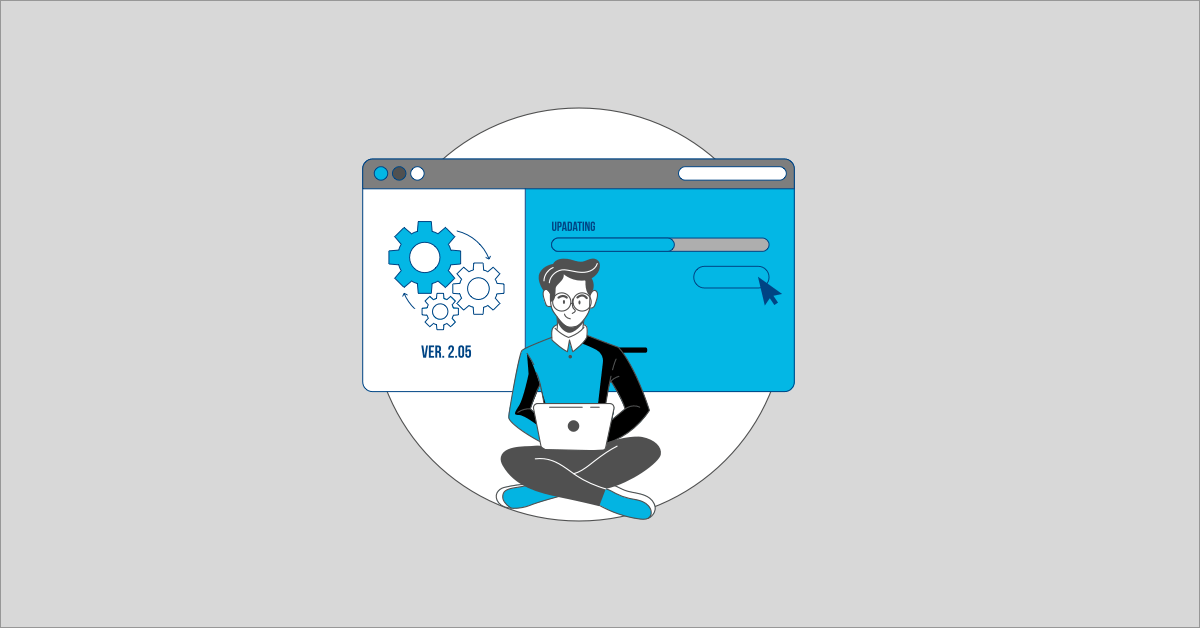Kodak, Nokia, Blockbuster, Segway: what do these companies have in common? Failure to innovate. It was difficult for these businesses to catch up with competitors. Although the only path for companies to accelerate growth is through powering innovation, it’s hard for them to focus since they are deeply entrenched in setting up basic processes and teams, sorting out communication challenges, and re-skilling cycles. Perhaps delegating by outsourcing software testing can be an unexpected yet very helpful strategy.
Finding a harmonious balance between internal staff and external resources is necessary to ensure constant productivity and improvement. You should try to understand the rationale behind other companies’ outsourcing decisions in order to assess if it could be the best course of action for your company. What benefits does it offer, and how does it create value?
According to Clutch, nearly 37% of small businesses took to outsourcing in 2019 for the reasons below.

Looking at the global statistics, the spending for outsourcing may hit $731 billion in 2023, including companies of all sizes.
Let us take a step back to understand what outsourcing is.
Outsourcing can be considered a business strategy that involves assigning tasks or operations to a service provider. A technology provider can outsource services such as software development, testing, ITIL services, and disaster recovery.
Despite being an essential part of software development, software testing is usually viewed in organizations as a non-core function. It may be both a gift and a disadvantage that software testing cannot be confined to a single tool or technology, and it has to be performed by skilled professionals. Getting specialized service partner help for test operations while utilizing sound knowledge from their talent pool is advantageous for an increasing number of enterprises. Outsourced software testing is the option to go for when you need a team that solely focuses on quality assurance.
The 4 Types of Innovation
Innovation is not limited to developing new products or applications, and there is no single recipe for achieving it; the market evolves as technology shifts. Most inventions are enabled by technology, which opens up a wide range of possibilities for them. The graph below depicts four categories of innovation based on technological novelty vs. market impact. Depending on a variety of criteria, organizations may choose to pursue one or more modes of innovation. We will examine each innovation in depth.
Disruptive Innovation
The term “Disruptive innovation” was coined by Harvard business professor Clayton Christensen in the 1990s.
What worked in the past will not assist the business now or in the future. Organizations must enhance their game with some game-changing revolutionary concepts. Disruptive innovation technologies are those that have the potential to radically revolutionize the way enterprises operate, such as robotic process automation, cloud computing, artificial intelligence & machine learning, cloud technologies, and so on.
The purpose of any disruptive innovation is not to improve the product or service but to leverage technology and make the product or service widely available at a lower cost and to a bigger audience. For example, “Audible” has disrupted the physical book market by making access to books more convenient for people who find it difficult to sit and read.
Outsourcing software testing in the disruptive innovation cycle can help companies to:
- Reduce the risk of errors
- Save costs
- Deliver products in less time
- Increase their efficiency
“Disruptive software solutions are delivering game-changing products, faster speed-to-market, enhanced customer experience, and increased competitive performance,”
Andy Hilliard – CEO of Accelerance, Inc.
Incremental Innovation
As the name implies, incremental innovation is the continuous improvement of current products or services. The goal is not to enter new markets or adopt new technology but to improve what is already in place. Because disruptive innovation entails higher risk and may or may not be warmly received by customers, most organizations invest a portion of their revenue in incremental innovation.
Consider Netflix as an example. Netflix began as a video streaming service by mailing DVDs to its customers; slowly, it evolved into OTT (Over-the-top) content provider with a particular focus on providing content based on an individual’s choice. Driving incremental innovation now, Netflix has introduced interactive shows to users. A user can engage with the ongoing show by choosing an option and selecting from the choices displayed on the screen.
The role of outsourcing software testing in incremental innovation can help organizations to:
- Manage and maintain the current applications
- Establish and sustain best practices
- Contextual knowledge base enabling incremental innovation
- Strengthen the internal processes
- Perpetual cost savings by co-creating the increments
Sustaining Innovations
Organizations provide an improved version of an existing solution and sell at a premium price for the customers. Sustaining innovations aim at retaining their position in the market. If a business has reached its peak, there is a need to protect its market share against its competitors by constantly improving its competitive advantage.
For example, in the mobile phone market, companies release new models every year with a promise of an improved software solution.
Outsourcing software testing in sustainable innovation can help organizations to:
- Leverage the service provider ecosystem for advanced skills
- Driving focused group through alpha and beta testing
- Building continuous agility
- Achieve flexibility, adaptability, and stability of resources
- Reduce risk and uncertainty
Radical Innovations
This type of innovation focuses on significantly impacting customer expectations by replacing existing methodologies. This type of innovation is mostly suitable for startups with disruptive ideas and less favorable for large enterprises.
“Radical innovation focuses on long-term impact and may involve displacing current products, altering the relationship between customers and suppliers, and creating completely new product categories.”
HBR Christian Hopp, David Antons, Jermain Kaminski, and Torsten Oliver Salge – What 40 Years of Research Reveals About the Difference Between Disruptive and Radical Innovation – Harvard Business Review.
For example, Salesforce embraced cloud computing and followed a SaaS business model.
Outsourcing software testing in radical innovation can help organizations to:
- Focus on core competencies
- Leverage partner ecosystem for faster process alignment
- Faster time to market
- Quick skill fulfillment
Final Thoughts on Outsourcing Software Testing
Companies are compelled to outsource tasks that are destined to provide little value to their activities due to the shortening of the product life cycle and the rise in uncertainty. In other words, outsourcing helps businesses to maximize their operational effectiveness and adjust to the continuous evolution and frequent changes in the market. Outsourcing software testing can provide additional benefits for an organization’s innovation path.
Okay, here are the FAQ questions with answers, directly drawing from the content of the MuukTest blog post on "Outsourcing Software Testing":
Frequently Asked Questions
1. What types of software testing can be effectively outsourced?
Virtually any type of software testing can be outsourced. The blog post specifically mentions functional testing, performance testing, security testing, usability testing, and automation testing as common areas. Many companies outsource repetitive tasks like regression testing, but also specialized areas where in-house expertise might be lacking.
2. How does outsourcing software testing help improve product quality and accelerate releases?
Outsourcing can significantly improve quality and accelerate releases by providing access to specialized expertise, advanced tools and technologies, and scalable resources. This allows for more comprehensive and efficient testing, identifying bugs earlier, reducing bottlenecks, and ensuring faster time-to-market with a higher quality product. It frees up internal teams to focus on core development.
3. What are the main differences between Staff Augmentation, Managed Services, and Hybrid outsourcing models?
Staff Augmentation involves hiring external QA professionals to work as an extension of your in-house team, under your direct management. You retain control over the process. When it comes to Managed Services, an external provider takes full responsibility for a defined testing scope or project, managing the team, processes, and deliverables autonomously. You define the outcomes, they manage the "how." As for the Hybrid Model, this is where there is a combination of both, where some testing functions are fully managed by the external provider, while external QA personnel might also be integrated into your internal teams for other tasks.
4. What are the key challenges companies might face when outsourcing software testing, and how can they be mitigated?
Key challenges include communication barriers (time zones, language), loss of control over the testing process, potential data security risks, and cultural differences. These can be mitigated by establishing clear communication protocols, defining well-documented requirements, choosing a reputable partner with robust security measures, and fostering strong, collaborative relationships.
5. When is the right time for a company to consider outsourcing its software testing efforts?
It's often the right time when your in-house QA team is overwhelmed, lacks specific expertise (e.g., performance or security testing), you need to scale up quickly for a major release, you're looking to reduce operational costs, or you want to improve efficiency and accelerate your release cycles. It's especially beneficial when you need dedicated focus on testing that your development team can't provide.











